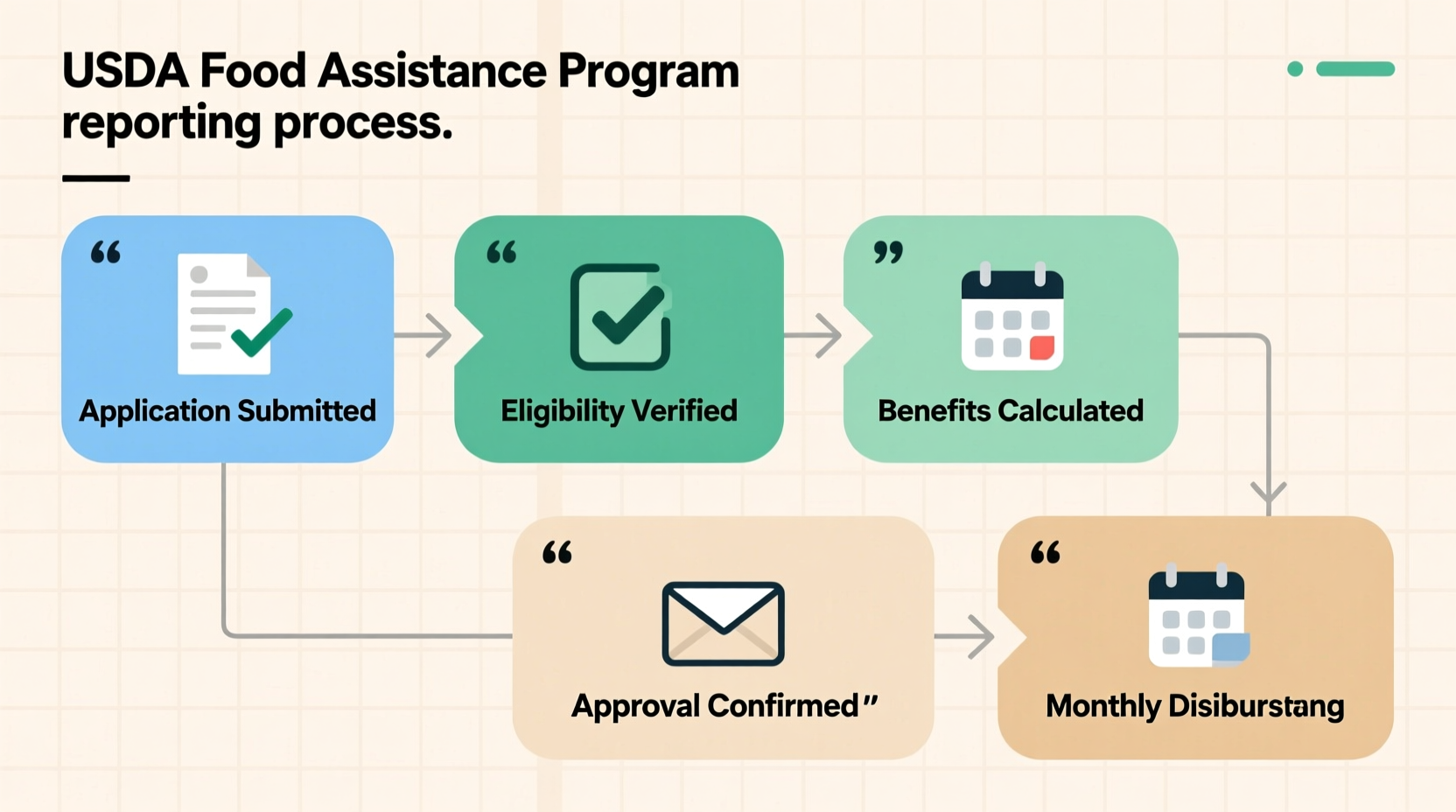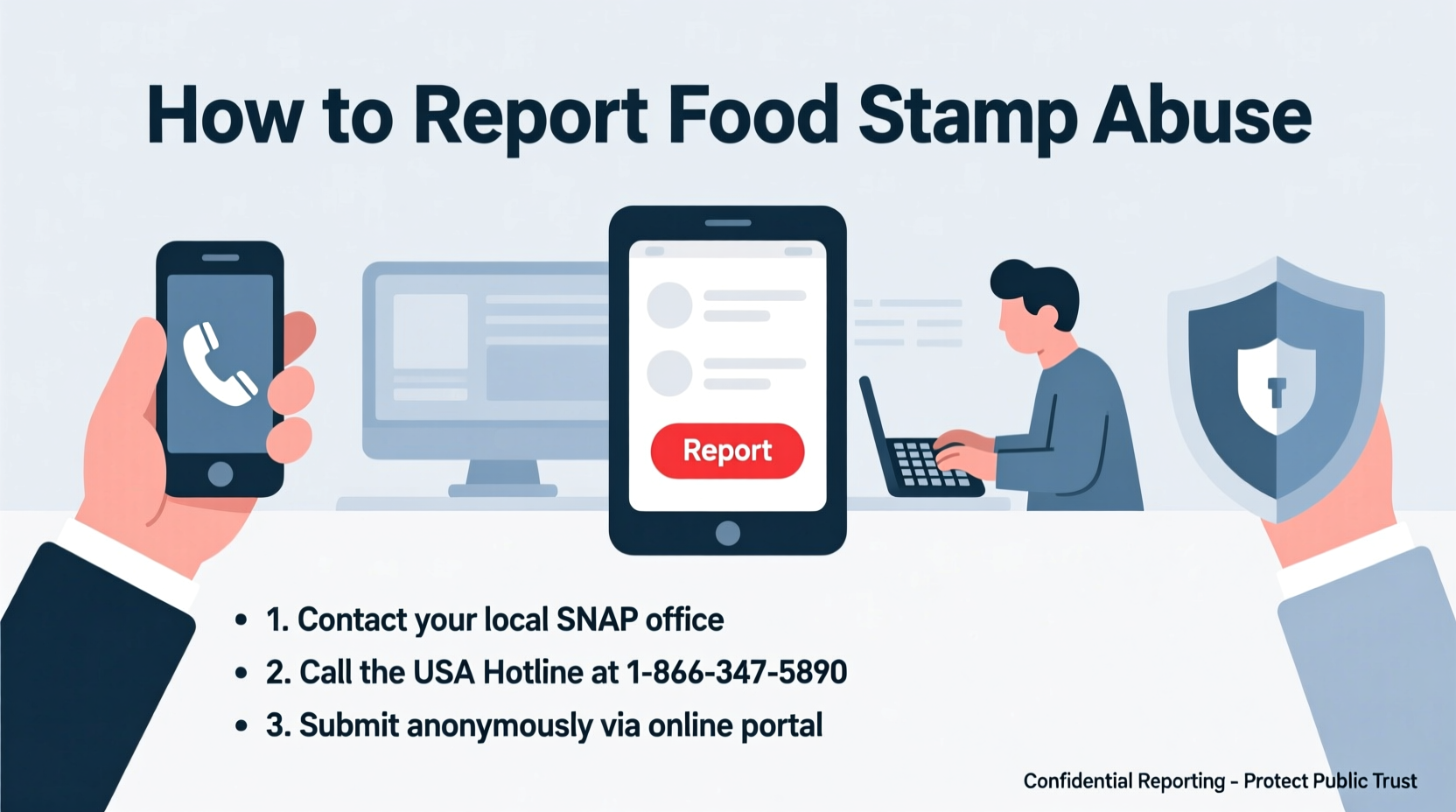If you suspect food stamp (SNAP) abuse, report it immediately through the USDA Office of Inspector General's official channels: call 1-800-424-9121, submit an online form at www.usda.gov/oig/hotline, or mail a written report to USDA OIG Hotline, P.O. Box 23399, Washington, D.C. 20026. All reports are confidentially investigated by federal authorities with no retaliation against legitimate whistleblowers.
Discovering potential food stamp fraud can leave you wondering how to take responsible action. Whether you've witnessed SNAP benefit trafficking, false eligibility claims, or retailer violations, knowing the proper reporting channels protects both vulnerable recipients and the integrity of the program. This guide provides verified, step-by-step instructions for reporting food stamp abuse through official government channels—ensuring your report receives proper attention while maintaining your confidentiality.
Understanding What Constitutes Reportable SNAP Abuse
Snap program abuse falls into specific categories recognized by the USDA. Knowing these distinctions helps determine whether your observation warrants reporting:
| Reportable Abuse | Not Typically Reportable |
|---|---|
| Selling or buying SNAP benefits for cash (trafficking) | Personal disagreements about someone's purchasing choices |
| Falsifying application information to receive benefits | Household members using benefits appropriately |
| Retailers exchanging SNAP benefits for prohibited items | Beneficiaries using benefits at authorized stores |
| Unauthorized use of another person's EBT card | Family members sharing a household's benefits |
This fact comparison shows why understanding the distinction between actual fraud and personal judgments matters. The USDA defines SNAP trafficking as "the buying or selling of SNAP benefits for cash or other items," which represents the most common form of reportable abuse according to official program data.
Step-by-Step Reporting Options
Choose the reporting method that best fits your situation and comfort level. Each official channel maintains strict confidentiality protocols.
Online Reporting (Recommended for Detailed Evidence)
The USDA OIG's online reporting system allows you to submit detailed information with supporting documentation. Visit the USDA OIG Fraud Reporting Portal to provide:
- Specific details about the suspected abuse
- Names, locations, and dates when possible
- Photographic or documentary evidence
- Your contact information (optional but helpful for follow-up)
This method creates an immediate digital record and provides confirmation of your submission. The online form specifically requests information about "suspected SNAP fraud, waste, or abuse" as defined in 7 CFR Part 278.
Phone Reporting (For Immediate Concerns)
Call the USDA OIG Hotline at 1-800-424-9121 (toll-free) between 8:30 AM and 5:30 PM Eastern Time, Monday through Friday. Spanish-speaking operators are available. When calling:
- Have specific details ready including dates, locations, and involved parties
- Ask about anonymity options if you have safety concerns
- Request a reference number for your report
According to USDA documentation, hotline operators receive specialized training in handling SNAP fraud reports and can direct complex cases to appropriate field offices immediately.
Mail Reporting (For Maximum Anonymity)
Send written reports to: USDA OIG Hotline, P.O. Box 23399, Washington, D.C. 20026. Include:
- Specific observations with dates and locations
- Business or individual names when known
- Any documentary evidence (avoid originals)
This method provides the highest level of anonymity since no phone records or IP addresses are associated with your report. The USDA confirms that mailed reports receive the same investigative priority as other channels.
What Happens After You Report Food Stamp Abuse
Understanding the investigation process helps set realistic expectations about outcomes and timelines:
0-3 Business Days: Initial review determines if the report meets investigation criteria
1-4 Weeks: Preliminary investigation begins with verification of reported details
1-6 Months: Full investigation conducted with evidence collection and interviews
Outcome: If fraud is confirmed, benefits may be terminated, restitution ordered, or criminal charges filed
The USDA OIG's 2024 Annual Report shows they investigated 14,327 SNAP fraud cases, resulting in over $217 million in financial recoveries. However, individual case resolution times vary based on complexity and available evidence.

Critical Considerations Before Reporting
Protect yourself and ensure your report leads to meaningful action with these essential guidelines:
Information That Strengthens Your Report
Reports with specific details receive higher priority. Include:
- Exact location (store address or residence)
- Dates and times of observed activity
- Description of individuals or businesses involved
- Specific transactions witnessed (e.g., "$50 in SNAP benefits exchanged for $35 cash")
Understanding Confidentiality Protections
The Whistleblower Protection Act safeguards legitimate reports made in good faith. Key protections include:
- Reports can be made anonymously through all official channels
- Personal information is protected under the Privacy Act of 1974
- Retaliation against legitimate whistleblowers is prohibited by law
However, completely anonymous reports may limit investigation effectiveness since follow-up questions cannot be addressed. The USDA OIG maintains that "reporter identity is protected to the fullest extent permitted by law" according to their official guidelines.
Avoiding Common Reporting Mistakes
Prevent wasted investigative resources by understanding these limitations:
- Do not report suspicions without specific evidence
- Avoid reporting based solely on personal judgments about others' purchases
- Never confront suspected abusers directly
- Do not report to non-governmental websites claiming to handle SNAP fraud
Remember that legitimate SNAP usage includes purchasing any authorized food items—even if you disagree with the choices. The program guidelines specifically permit beneficiaries to purchase "food for the household to eat," with only certain restrictions on alcohol, tobacco, and hot prepared foods.
State-Specific Reporting Options
While the USDA OIG handles federal investigations, many states operate complementary reporting systems:
- California: 1-800-952-5253 (State Department of Social Services)
- New York: 1-888-328-6399 (State Office of Temporary and Disability Assistance)
- Texas: 1-800-457-7597 (Health and Human Services Commission)
Check your state's human services website for local reporting options. Some states require initial reports to be made locally before federal involvement. The USDA maintains a complete directory of state SNAP agencies for reference.
When to Contact Law Enforcement Directly
In certain situations, immediate law enforcement involvement may be necessary:
- Threats or violence related to SNAP fraud
- Observed criminal activity beyond SNAP violations
- Emergencies involving immediate danger
Call 911 for emergencies or your local police department for non-emergency situations. Law enforcement agencies coordinate with USDA investigators when SNAP fraud intersects with other criminal activities.











 浙公网安备
33010002000092号
浙公网安备
33010002000092号 浙B2-20120091-4
浙B2-20120091-4